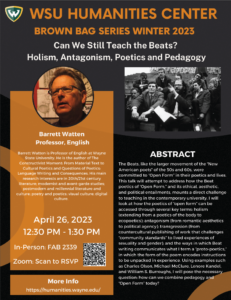Can We Still Teach the Beats?:
Holism, Antagonism, Poetics,
and Pedagogy
A talk by Barrett Watten
Wednesday, April 26
WSU Humanities Center
12:30–1:30 PM, 2339 F/AB
In person/Zoom (here)
This talk will be drawn from a theoretical and historical reading of Beat poets Michael McClure (famous for transgressing species barriers and writing in “beast” language; now seen as a pioneer ecopoet as well as a poet writing at the intersection of language and the body) and Lenore Kandel (famous for her 1960s sex-positive collection The Love Book and other erotically charged writing; she is now seen a proto-feminist representative of the 60s sexual revolution). Both poets were subject to censorship in the 60s—McClure for his play The Beard, featuring a dialogue between Billy the Kid and Jean Harlow; and Kandel for The Love Book; both would be vindicated in the long run. Encompassing this moment are the poetics of “open form” promulgated by Charles Olson and others, as the pedagogical framework for Black Mountain College through the 1950s, and at later experimental programs. In adapting my research to the present talk, the question on the table is how to teach the work of the Beat poets today, with their expressive/embodied excesses and absolute refusal to comply to with normative decorum. This is not a hypothetical question. The recent decision at Cornell University not to require trigger warnings for difficult material was a significant pushback against content restrictions in the classroom, and supported the discretion of faculty to present course material. But this issue is not simply a matter of Right or legal guidelines; how does one present and interpret the transgressive work of an earlier period, both as a research topic and a teaching occasion? How did the Beats themselves imagine their work as “teaching, and being taught,” as we see in the publicity photo of Allen Ginsberg from 1965? How do we contextualize their historical present from the perspective of ours? The stakes for our pedagogy in the increasingly corporatized university are high.
Flyer: The Beats, like the larger movement of the “New American poets” of the 50s and 60s, were committed to “Open Form” in their poetics and lives. This talk will attempt to address how the Beat poetics of “Open Form,” and its ethical, aesthetic, and political entailments, mounts a direct challenge to teaching in the contemporary university. I will look at how the poetics of “open form” can be accessed through several key terms: holism (extending from a poetics of the body to ecopoetics); antagonism (from romantic aesthetics to political agency); transgression (from countercultural publishing of work that challenges “community standards” to lived experiences of sexuality and gender); and the ways in which Beat writing communicates what I term a “proto-poetics,” in which the form of the poem encodes instructions to be unpacked in experience. Using examples such as Charles Olson, Michael McClure, Lenore Kandel, and William S. Burroughs, I pose the necessary question: how can we combine pedagogy and “Open Form” today?
Notes and links
Facebook event page: https://www.facebook.com/events/897262941380645
Image: Allen Ginsberg and international poets at Royal Albert Hall, London, 1965. Front row: Harry Fainlight, Alex Trocchi, Ginsberg, John Esam, John Richter (cut off); back row: Adrian Mitchell, Anselm Hollo, Marcus Field, Michael Horovitz, Ernst Jandl; woman crossing behind group, Barbara Rubin.
For Harry Fainlight’s photos from the International Poetry Congress reading, here.
For a more declamatory Ginsberg, “Beat Poets in London,” Getty Images, here.
For a memoir of the Royal Albert Hall reading, see Paul A. Green, review of Young Adam, dir. David Mackenzie, from the novel by Alexander Trocchi (2003), here.
On the debate on “trigger warnings” at Cornell University, see: “Cornell gives Student Assembly a firm ‘no’ on trigger warning mandate,” FIRE News, 3 April 2023, here.














